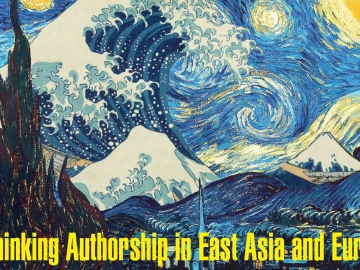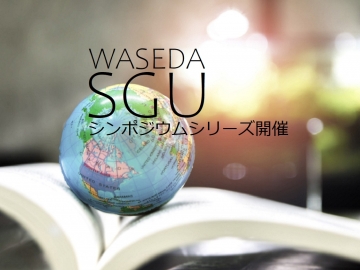On Saturday, March 12, 2022, the workshop “How to Globalize Premodern East Asian Studies? Linguistic and Cultural Translation Theory and Practice” was held online under the sponsorship of the Top Global University Project of Waseda University Global Japanese Studies, and co-sponsored by the Research Institute of Japanese Classical Books at Waseda University Comprehensive Research Organization, the School of Humanities, Arts, and Social Sciences, Literature at the Massachusetts Institute of Technology, and the Ryusaku Tsunoda Center of Japanese Culture at Waseda University’s Research Institute for Letters, Arts, and Sciences.
This workshop was planned especially with a view to the publication project of Chinese, Korean, and potentially English translations of A Comparative History of East Asian Literatures, the last volume of the three-volume A New History of Japanese “Letterature” (Bensey Publishing) published between 2015 and 2019. The aim was to report and discuss the problems of translating technical terms in East Asian classical studies, and the possibility of documenting our translation experiences in a more generably usable glossary of terms . It was organized by Wiebke Denecke (Professor, Massachusetts Institute of Technology) and Kimiko Kono (Professor, Waseda University), the editors of the said book series.
The Chinese translation of the volume is being prepared for publication under the leadership of Professor Juan Xueyan (Tsinghua University, PRC) and plans are also being made for a Korean edition in collaboration with Drs. Song Ho-bin and Johann Noh of Korea University (Republic of Korea). The third volume of A New History of Japanese “Letterature” examines in parallel the transition from the older world of “Letters” to 19-th century, Western-inspired forms of “literature” in East Asia from the perspective of Japan, China, and Korea. It moves chronologically from the early modern period, to the modern and contemporary periods, and examines the issues of “letters” and “literature” and their future as shared problems in East Asia both in literary historiography and literary creation. It also attempts to view these issues from a world-historical perspective, with East Asia being a major macro-region among others.
The translation project was initiated by the enthusiasm of our Chinese and Korean colleagues who felt this volume is of great relevance and could be of great impact on research communities in classical studies in China and Korea.

The workshop began with an introduction of the background of the translation project by the organizers, Kimiko Kono and Wiebke Denecke, and an explanation of the purpose of the workshop, which was to discuss the possibilities and challenges of both linguistic and cultural translation for facilitating the collaborative study of premodern East Asia both across various East Asian research communities and Western academe. Presentations were given by Yue Qu Yue and Feng Chenchen, our graduate students, and Dr. Johann Noh of Korea University, to which Professor Juan Xuanyan and Dr. Song Ho-bin of Korea University, and Professor Matthew Fraleigh of Brandeis University offered comments, followed by lively discussion. The discussion addressed interesting divergences in academic terminology that arise across Japanese, Chinese, Korean, and English when writing about classical literature and in general humanistic research on premodern East Asia. It also touched on how this fits with new, comparative and global humanities research. The current status and challenges of classical studies in Japan, China, and Korea, as well as the significance and potential of global coopertations and specific solutions to boosting these studies were also discussed. The online workshop was well-attended, with students and faculty from Waseda University, Tsinghua University, and Korea University also participating in the workshop. During the Q&A session, Zeng Yanjie and Xu Mengzhou, graduate students at Tsinghua University who are currently working on the Chinese translation, also shared their practical experiences.
The workshop concluded with everybody’s reflection on the status of studies of premodern East Asia in different countries, on the challenges of “linguistic” and “cultural” translation we are currently facing and on thoughts for future collaboration and mutual support in this area.
Attendee’s comments
- “This was my first time attending a workshop: I found it to be extremely stimulating. It was very interesting to learn about the latest translation-related issues from people who are exposed to new information across various countires all the time. In particular, the differences in the names the Korean universities give their departments of Chinese literature, and the images people get from them were new to me, as I could not have learned about them just from being in Japan. Also, in the research presentations of Japanese to English translation, there were many points that caught my attention as the presenters were both “non-native” speakers of both Japanese and English. They got me imagining and wondering what it would be like if I, a native Japanese speaker, had to translate them, and it also gave me a chance to think positively about my future research. The experience of diving into this high-level environment and realizing how far I have yet to go gave me motivation for my future studies.” (Miyuki Naito, Senior, School of Humanities and Social Sciences, Waseda University)
- “In the English version of The Tale of Genji that I myself studied for the graduation thesis, some works were daring free translations into English, but in the translation of the introduction to A Comparative History of East Asian Literatures, I felt that all three translators shared the same approach of carefully selecting the appropriate translation word by word and sometimes adding annotations where necessary. Although it does not mean literature should be translated freely and research books literally, I still felt that the difference in genres may have influenced the attitude toward translation. The workshop also made me keenly aware that difficulties in translation are not only caused by differences in language, but also by differences in culture, and I realized that in such cases, we should not decide how to translate based solely on our own interpretation, but it is important to consider previous research. Since incorporating past translations in literary translations can make them seem like imitations, I thought that there might be differences between translations of literature and research books in regard to whether past works are to be taken into account.” (Airi Yagi, Senior, School of Education, Waseda University)
- “Through today’s workshop, I heard many valuable stories ranging from ideas about various concepts related to literary history to problems that arise when working on actual translations. The virtues of “faithfulness,” “expressiveness,” and “elegance” are always mentioned when we talk about translation, and I was once again made aware that when translating an academic text, a different translation method is required from that of translating literary texts. I learned a significant amount from observing the valuable approaches offered on matters such as determining how to settle on the translation of technical terms, actively using parentheses to retain both the pronunciation of the original language or a translation with a commonly accepted meaning, and the way the subject is handled when translating into another language!” (ZHU, Yimai, 1st year, Master’s course, Graduate School of Letters, Arts and Science)
- “I gained a lot from listening to everybody’s presentations. Hearing the presenters’s perspectives on Chinese, Korean, and English translation made me realize once again that the task of translation is not just a simple process of converting one language into words in another language. While accuracy is obviously required for translation, the important goal of this complex translation process is to pursue clarity—in another language and culture. I have gained a profound understanding of the need to overcome problems in translating, such as cultural and notational issues, in order to achieve this goal.” (LI, Yali, 2nd year, Master’s course, Graduate School of Letters, Arts and Science)
- “In this forum, translation accuracy, especially with regard to periodization was actively discussed. Even within the Japanese language, the term “modern period” alone refers to a variety of periods, such as “modern period” in Japanese history, “modern period” in world history, etc., and to translate such concepts, we need a vast amount of knowledge of the their use in other languages and cultures. The Korean team talked about the possibility of developing a glossary of terminology of studies of premodern East Asia. It was also pointed out that in Japanese-English translation, technical terms should be translated by referring to past translations into English. Based on these points, I recognized once again that the unification of translations and the establishment of a standard for translating technical terms are urgent issues for our fields.” (Kenta Iguchi , 2nd year, Master’s course, Graduate School of Letters, Arts and Science)
- “Attending the workshop, “How to Globalize Premodern East Asian Studies?”, which was about translating A Comparative History of East Asian Literatures I was extremely stimulated by the enriching presentations and heated discussions. Although in the past, Japan, China, and Korea belonged to the same cultural macroregion—the so-called Sinographic Sphere,” many of the same words have different meanings today. For instance, the terms “early modern”, “modern”, and “contemporary” attributed to historical periodization in Japan were a topic of intense discussion at the workshop, but how accurately they can be conveyed in Chinese translations, for example, is a test of the translator’s skills. Bridging the gap like this, I believe, is one of the keys to the globalization of classical studies.” (Yi Dan, 3nd year, Master’s course, Graduate School of Letters, Arts and Science)
Event detail
Date and time: 9:00-12:00 (JST) March 12, 2022
Venue: Online (Zoom)
Moderator: Wiebke Denecke (Professor, MIT), Kimiko Kono (Professor, Waseda University)







